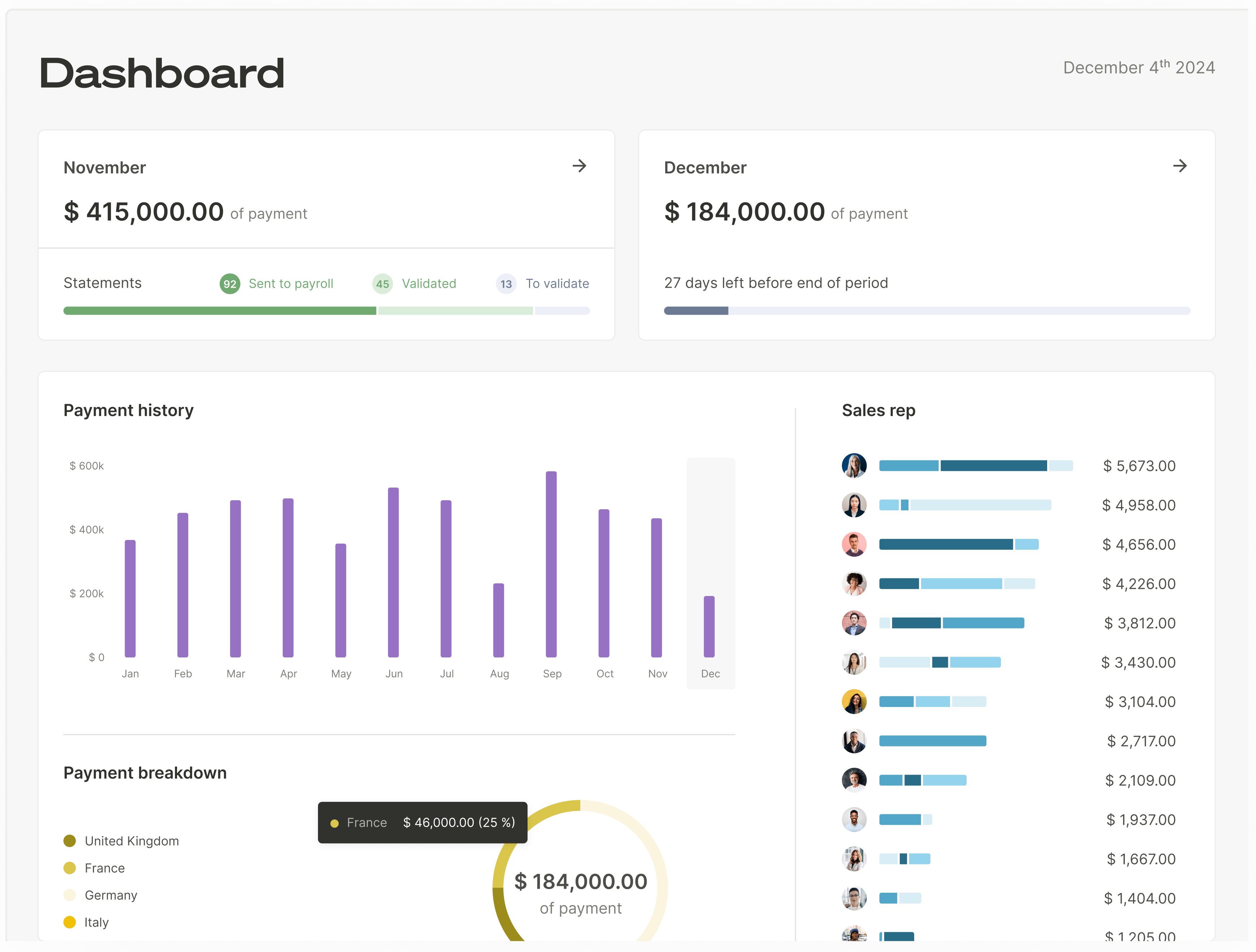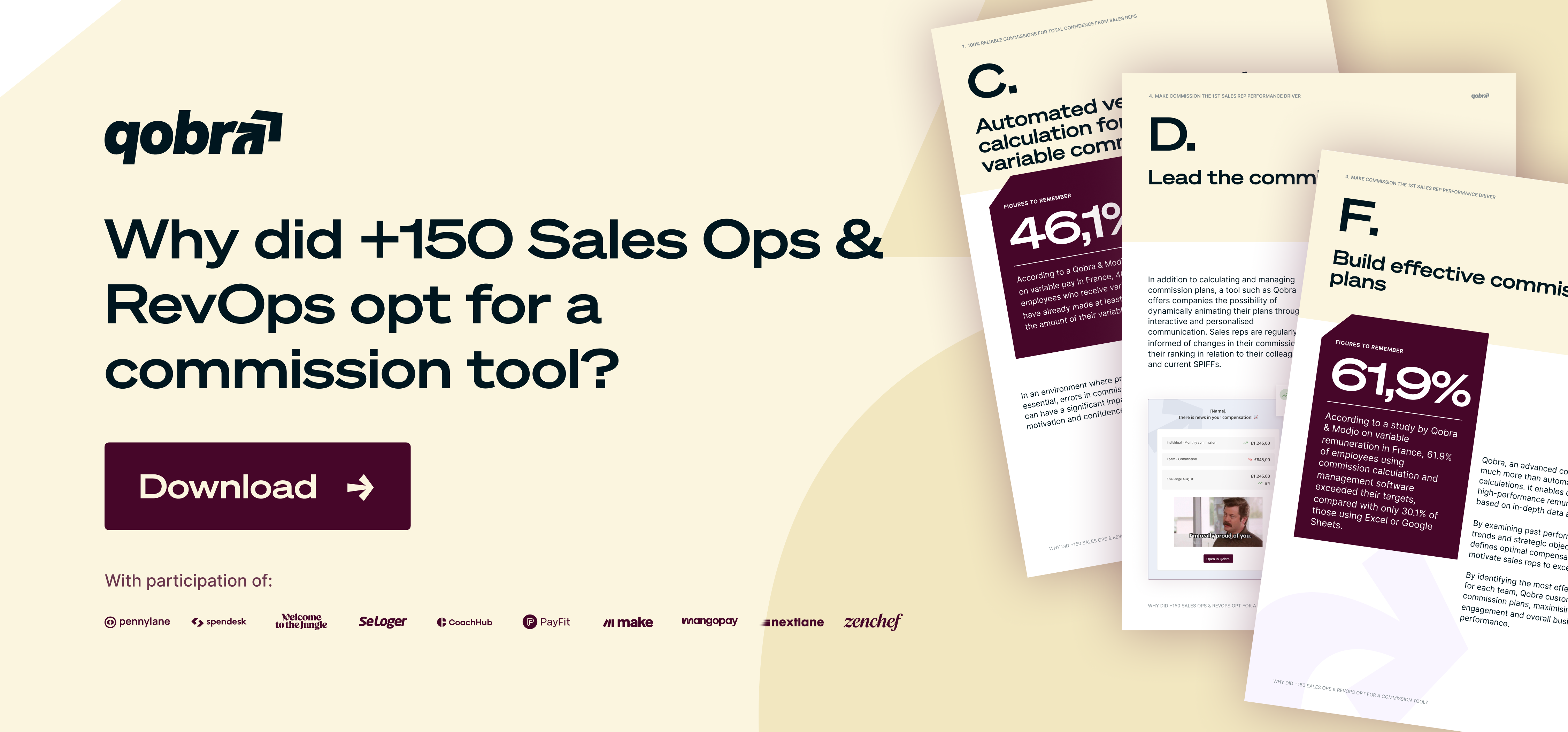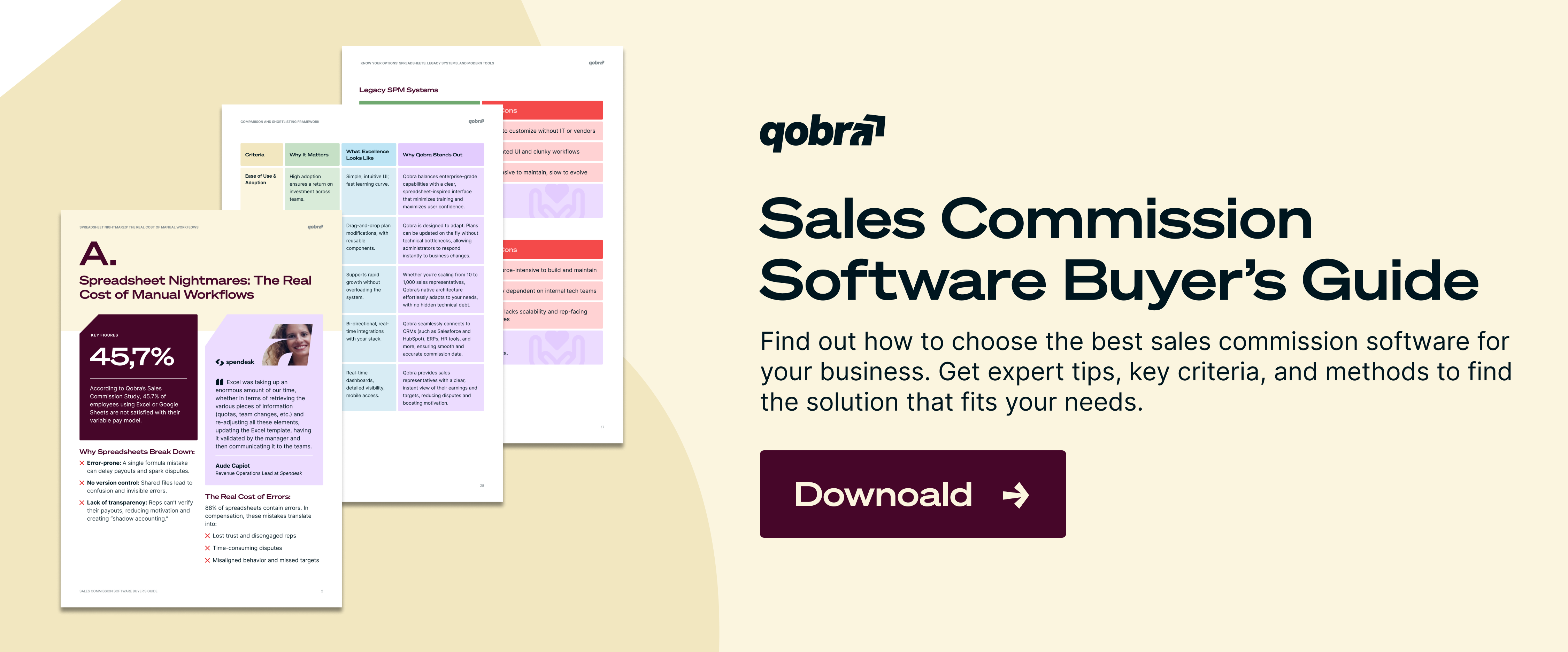Webinar (Wednesday, February 25): RevOps as a Strategic Growth Driver, with n8n, Polaris Ops, and Qobra
RegisterThe sales environments of our generation are becoming increasingly competitive. As a result, motivating teams through fair, transparent, and aligned compensation has become a strategic priority. However, many companies still manage bonuses using Excel... or outdated internal tools, leading to errors, disputes, and hours of lost productivity.
Enter the Incentive Compensation Management (ICM) system: a software solution designed to automate and optimize how companies manage variable compensation plans. In this article, we’ll explore what ICM is, how it differs from traditional compensation methods, and how to choose the right solution for your business.
.
What is incentive compensation management software for sales?
Let's start with a brief definition of this concept. An Incentive Compensation Management (ICM) system is a digital platform that enables businesses to plan, execute, and monitor sales incentive programs with precision. ICM software automates commission calculations, tracks performance in real-time, and ensures payouts are aligned with actual results and business goals. When designing your incentive compensation plan, it's crucial to consider both automation capabilities and strategic alignment.
Why do organizations (should) use ICM systems?
Companies adopt ICM systems to:
- Replace manual or error-prone tools like Excel.
- Improve trust and transparency around compensation.
- Reduce administrative workload for finance and sales ops teams.
- Align sales incentives compensation with corporate strategy.
The top incentive compensation management software programs of 2026
From market leaders to emerging disruptors, here’s a curated selection of the best ICM solutions available this year:
Qobra – Best for Transparency and Ease of Use

G2 Rating: ★★★★★ 4.8 | Capterra Rating: ★★★★★ 4.9
Qobra stands out as the most balanced and modern solution in the market today. Built from the ground up for Sales Ops, Finance, and Sales teams, Qobra brings clarity to complex commission plans through real-time dashboards, automated calculations, and seamless CRM integration (notably with Salesforce and Hubspot).
But beyond automation, what truly sets Qobra apart is transparency. Sales reps know exactly what they’re earning, and why, at any point in the cycle. Finance teams eliminate back-and-forth. And Sales Ops can iterate and deploy new plans without technical bottlenecks.
"Since we've had Qobra, we've seen a 15-20% increase in the achievement of objectives."
Tomas Hons, GTM Strategy & Operations Manager at Make
For scaling businesses seeking control and alignment, Qobra delivers a rare mix of power, simplicity, and trust. It’s the benchmark others are measured against.
QuotaPath – Best for Growing Sales Teams
G2 Rating: ★★★★★ 4.7 | Capterra Rating: ★★★★☆ 3.8
QuotaPath has gained strong adoption among startups and mid-market companies thanks to its ease of setup and user-friendly interface. It simplifies compensation planning and provides reps with quick visibility into their earnings, ideal for fast-paced sales environments.
The tiered pricing model supports scalability, but its analytics and customization remain limited for companies with intricate plan logic or large global teams.
Best fit: Growth-stage companies prioritizing speed over complexity.
Watch-out: May fall short for enterprise-grade reporting and governance.
👉 Discover QuotaPath’s Alternatives
Xoxoday Compass – Best for Multi-Geo & Complex Incentive Structures
G2 Rating: ★★★★★ 4.6 | Capterra Rating: ★★★★☆ 4.3
Xoxoday Compass is a comprehensive Incentive Compensation Management platform built for organizations operating with multi-layered, multi-geo incentive structures. It centralizes modeling, administration, and payout execution while giving sales teams real-time visibility into goals, earnings, and performance progress.
Where Compass stands out is in its advanced rule engine — designed to support quotas, tiers, accelerators, clawbacks, SPIFFs, and complex cross-team logic. Combined with automated workflows and robust governance, it’s a strong option for enterprises needing both flexibility and compliance.
Best fit: Organizations with multi-region, multi-role, or highly customized incentive structures needing strong governance and scalability.
Watch-out: Advanced configuration may require more onboarding support for first-time ICM users, and the platform is best suited for mid-market to enterprise teams with established sales operations.
Performio – Best for Regulated Industries
G2 Rating: ★★★★☆ 4.4 | Capterra Rating: ★★★★☆ 4.3
Performio is a robust tool tailored for enterprises with compliance-heavy requirements. Its strength lies in handling complex incentive structures and delivering detailed audit trails, features that are critical in finance, insurance, and pharmaceuticals.
However, the learning curve can be steep. Its interface is more functional than intuitive, and technical support is often needed for implementation and plan changes.
Best fit: Large enterprises with compliance obligations and complex plans.
Watch-out: Less agile for small teams or non-technical users.
Spiff – Best for High-Growth Startups
G2 Rating: ★★★★★ 4.7 | Capterra Rating: ★★★★★ 4.7
Spiff shines with its sleek interface and rapid onboarding. It’s a favorite among startups seeking to move fast and offer reps real-time incentive visibility. Forecasting tools and clean UI make it easy to adopt across fast-moving sales teams.
Yet, Spiff’s configurability can be limiting for companies with complex compensation logic or large international structures. Agile, yes, but not deeply customizable.
Best fit: Tech-forward startups wanting quick wins.
Watch-out: Scalability may be constrained as teams and territories grow.
👉 Discover SPIFF’s Alternatives
Varicent – Best for Enterprise Complexity
G2 Rating: ★★★★★ 4.5 | Capterra Rating: ★★★★★ 5
Varicent is the heavyweight in this space. Designed for Fortune 500-scale organizations, it offers deep configurability, advanced analytics, and strong territory/quota management tools. It’s a full Sales Performance Management (SPM) suite rather than a standalone ICM tool.
That power comes at a cost: implementation is long, total cost of ownership is high, and dedicated admin resources are often required.
Best fit: Mature enterprises with complex sales ecosystems.
Watch-out: Overkill for smaller businesses or companies seeking fast deployment.
Everstage – Best for Sales Motivation and Engagement
G2 Rating: ★★★★★ 4.9 | Capterra Rating: ★★★★★ 4.8
Everstage brings a refreshingly dynamic and gamified approach to incentive compensation. Leaderboards, real-time dashboards, and clear visualizations help reps stay focused and competitive. It’s particularly well-suited for motivating younger or remote sales teams.
While still maturing in terms of depth and integrations, Everstage is building credibility quickly among fast-scaling teams.
Best fit: Teams prioritizing culture, visibility, and engagement.
Watch-out: Still evolving in terms of enterprise-grade depth and custom logic.
👉 Discover Everstage’s Alternatives

Choosing the Right ICM Solution: It depends on your stage
Qobra
- Best For: Transparency + Scaling
- Company Size: Mid to large
- Strength: Intuitive UX, strong integrations
- Watch-out: Benchmark, few drawbacks
QuotaPath
- Best For: Growing sales teams
- Company Size: Small to mid-sized
- Strength: Easy onboarding
- Watch-out: Limited enterprise functionality
Xoxoday Compass
- Best For: Multi-geo & complex incentive structures
- Company Size: Mid to large
- Strength: Advanced rule engine, strong governance
- Watch-out: Requires onboarding support for complex setups
Performio
- Best For: Compliance-heavy industries
- Company Size: Large
- Strength: Reporting, audit readiness
- Watch-out: Steep learning curve
SPIFF
- Best For: High-growth startups
- Company Size: Small to mid-sized
- Strength: Fast deployment, forecasting
- Watch-out: Light on complex logic
Varicent
- Best For: Large enterprise
- Company Size: Enterprise only
- Strength: Deep analytics, scalability
- Watch-out: Heavy to implement
Everstage
- Best For: Motivating sales teams
- Company Size: Mid-sized
- Strength: Gamification, real-time dashboards
- Watch-out: Lighter on back-end controls
Which criteria should be considered when selecting incentive compensation software?
Choosing the right ICM solution depends on the specific needs and maturity of your sales organization. Here are the most critical selection criteria:
1. Plan Complexity & Team Size
- Small teams with simple commission structures may manage with basic tools.
- Larger teams or multi-layered plans require advanced automation and scalability.
2. Integration with Your Tech Stack
- Ensure compatibility with your CRM (e.g. Salesforce), ERP, and payroll systems.
- Real-time data sync is key to transparency and efficiency.
3. Ease of Use
- Look for platforms that are easy to configure and intuitive for all users, not just Ops or IT.
4. Visibility & Transparency
- Choose software that offers real-time dashboards and clear payout explanations to foster trust and engagement.
5. Support & Implementation
- A dedicated customer success team and solid onboarding process can make or break adoption.
6. Regulatory Compliance & Auditability
- Your system should support compliance with local labor and financial regulations, and make audits straightforward.
Final Thoughts
An Incentive Compensation Management system is much more than a commission calculator. It’s a strategic asset that aligns teams, drives performance, and frees up time for what really matters: selling.
For businesses ready to move beyond Excel and regain control of their incentive plans, modern ICM software like Qobra offers transparency, speed, and confidence in every payout.
Ready to see how our software can help you boost performance and reduce complexity?

FAQ - ICM Systems
What is the impact of effective ICM on employee performance?
Accurate, transparent, and timely commissions lead to better sales focus, stronger motivation, and higher retention rates. According to a study by Qobra and Modjo, 61.9% of reps using an ICM tool exceeded their sales targets, compared to just 30.1% using spreadsheets.
How to choose the right ICM software for my organization?
Begin by assessing:
- Your team’s size
- Commission plan complexity
- Existing tech stack (CRM, payroll, ERP)
- Your internal bandwidth for onboarding and administration
Then compare vendors not just on price, but also on support, UX, and flexibility.
What are common challenges in managing incentive compensation?
- Manual errors and disputes due to spreadsheets
- Lack of real-time visibility for reps
- High admin burden for Ops and Finance
- Misalignment between incentives and strategic goals
To address these challenges effectively, it's essential to track the right metrics in your incentive compensation programs.
How can ICM be integrated with existing sales processes?
A good ICM system should sync seamlessly with your CRM, ingest deal data automatically, and reflect real-time quota attainment. This integration allows for performance-based payouts without lag or manual intervention.







